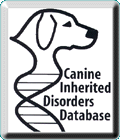
Phosphofructokinase (PFK) deficiency
The enzyme PFK is important in energy metabolism in red blood cells and in skeletal muscle during intense exercise. PFK deficiency is an inherited disorder that causes premature breakdown (hemolysis) of red blood cells, and a reduced tolerance for exercise. Affected dogs have chronic mild anemia with intermittent bouts of acute hemolysis, often associated with intense exercise, overheating or prolonged barking.
This is an autosomal recessive trait which means both parents of an affected dog are carriers of the disorder. Carriers have about one half normal enzyme activity in red blood cells and muscle tissue, and are clinically unaffected.
Affected dogs have a persistent mild anemia (low levels of red blood cells) for which they are generally able to compensate. Intermittently they will have acute episodes of red blood cell breakdown (hemolysis), when they become lethargic and weak. This is usually associated with intense exercise or excessive barking or panting. Their mucous membranes (eg. gums) are pale or jaundiced and they usually run a high fever. You may notice the urine is brown due to the excretion of blood breakdown products. At these times your dog will require veterinary attention.
Dogs with this condition can have a normal life span. Management of this condition requires avoidance of stress, strenuous exercise, overheating and over excitement.
Based on clinical examination and blood tests, your veterinarian will diagnose hemolytic anemia (low levels of red blood cells due to increased breakdown) in your dog. Further tests will be required to diagnose this specific condition.
There is no specific treatment for this disorder, other than supportive care during an episode of bleeding (which may require a blood transfusion). Carrier and affected dogs should be removed from the breeding population.
The condition can be well-managed, and your veterinarian will discuss this with you. You will need to be alert for signs associated with increased intravascular hemolysis (red cell breakdown), such as weakness, lethargy, pale or jaundiced mucous membranes, or brownish urine. It is also important to avoid stressful situations, strenuous exercise, excitement that will cause a great deal of barking, and high environmental temperatures.
CLINICAL: persistent compensated hemolytic anemia (PCV at or near normal) with intermittent hyperventilation-induced hemolytic crises with (usually mild) exertional myopathy, poor exercise tolerance; during hemolytic crisis, signs may include lethargy, weakness, hepatosplenomegaly, muscle wasting, pale or icteric mucous membranes, pyrexia (to 41 degrees Celsius).
LABORATORY: A specific genetic test can identify carriers and affected animals at any age (see reference below). Affected and carrier dogs can also be identified based on PFK activity in blood samples. Check with your clinical pathology lab for requirements for sample submission.
Because this is an autosomal recessive trait, both parents of affected dogs carry the defective gene. Neither affected (homozygous) or carrier dogs (heterozygous) should be used for breeding. There is a DNA test that can identify carrier dogs at any age (see reference below). Many affected and carrier dogs have already been removed from the breeding population.
Harvey, J.W. 1995. Congenital hemolytic anemias and methemoglobinemias. ACVIM-Proceedings of the 13th Annual Veterinary Medical Forum: 37-40.
Henderson A. Anemia, Hemolytic. In: Côté E, ed. Clinical Veterinary Advisor Dogs and Cats. Missouri: Mosby Elsevier, 2007:64-66.
Sargan DR. Phosphofructokinase deficiency. In IDID - Inherited diseases in dogs:web-based information for canine inherited disease genetics.
Genetic testing (English and French) Labgenvet: www.labgenvet.ca
www.vetgen.com - information on genetic testing available
- (Disorder) related terms:
- Disorder Type:

